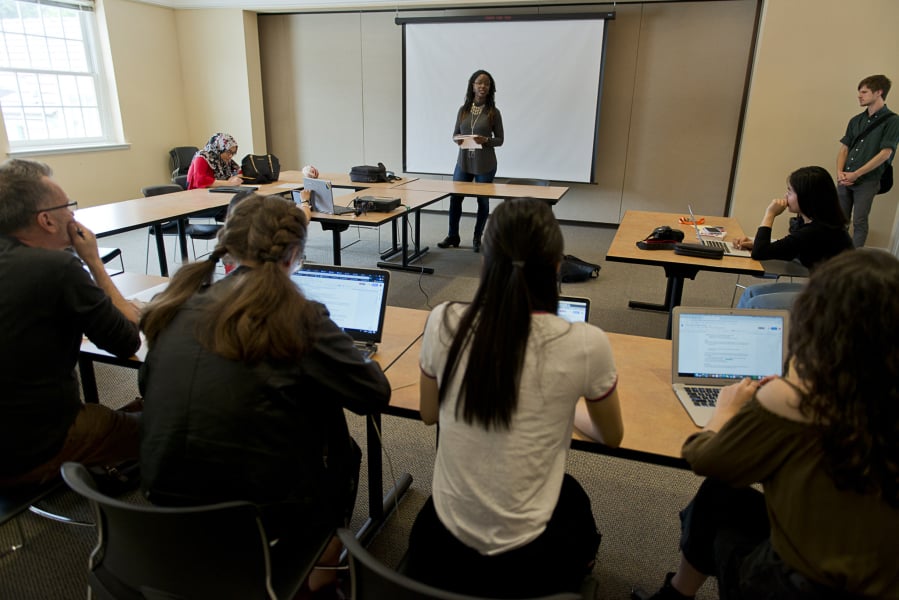CAMAS — The spotlight comes with attention, whether wanted or not.
Just ask marine biologist David Scholnick. When people think of marine biologists, most think about diving into the sea with marine mammals or pulling golf balls from whales’ blowholes. However, Scholnick said his work is not terribly exciting, even to his family. He has dedicated his career to studying shrimp laden with bacteria.
“I’m not the most popular person, or even scientist, in the room,” he said.
But something unusual happened more than eight years ago; one of Scholnick’s experiments went viral. He and some colleagues were studying how recent changes in the oceans could potentially affect the ability of marine organisms to fight infections. Since shrimp are active animals in nature, and Scholnick wanted to study how their activity affects immune responses, they built a tiny treadmill for captive shrimp to run on.
The once small-time marine biologist drew praise and curiosity from some, and ire from politicians. He was discussed on TV and in Congress.
If you go
What: The first ever TEDxYouth@Camas event, which has a theme of “Seeing the Invisible.”
Where: Discovery High School, 5125 N.W. Nan Henriksen Way, Camas.
When: 5 to 8:30 p.m. June 8.
Cost: $7 for students, $10 for general public.
Information:www.tedxcamas.weebly.com
A few years removed from the hoopla, Scholnick, a professor at Pacific University in Forest Grove, Ore., is ready to talk about his time in the spotlight. He will be one of 10 speakers at the first ever TEDxYouth@Camas event, starting at 5 p.m. June 8 at Discovery High School, 5125 N.W. Nan Henriksen Way, Camas. The officially-sanctioned TED event was organized by 18 students in the Camas School District, and the speakers range from scientists to educators to others in the community. The topic of the event is “Seeing the Invisible.”
Scholnick’s project was a novelty at first, with an invitation to the “Today Show.” People uploaded videos of the shrimp on the treadmill running to “Eye of the Tiger” and the theme song to “The Benny Hill Show.”
Then the attacks started. Republicans used the absurdity of shrimp on a treadmill as an example of government bloat and wasting taxpayers’ money. The project was included in a roundup on Forbes.com of the “Thirteen Silliest Uses Of Taxpayer Money,” after the original article, later removed, wrongly claimed that the shrimp treadmill cost $3 million.
In 2014, Scholnick defended his work with an article in the Chronicle of High Learning titled, “How a $47 Shrimp Treadmill Became a $3 Million Political Plaything,” where he described the purpose of his work and how he built the treadmill with his own money and an inner tube from an old truck tire, bearings borrowed from a skateboard, and a used pump motor.
“Small ideas lead to big discoveries,” Scholnick said, adding that people should celebrate and collaborate on taking small steps forward, as those lead to large leaps.
Charlene Williams, Camas School District’s assistant superintendent, is another speaker, and her talk looks at discussing race, specifically how people saying they don’t see race isn’t a great way to talk about race at all. Tim Hackenberg, a professor of psychology at Reed College, will give a talk on the minds of animals, and Vancouver musician Mac Potts, who recently appeared on “American Idol,” will talk about connecting to people through music and going through life while blind. He was born without the ability to see.
Other speakers are social entrepreneur Adam Lewis, Jim Pressnell, executive director of These Numbers Have Faces, Wilson High School senior Amy Sloan, Westview High School senior Divya Amirtharaj, Washington State University math professor Bala Krishnamoorthy and Centennial High School senior Sarah Ali.
The organizers reached out to various groups and put it on social media they were looking for speakers, and received nearly 60 submissions from people wanting to participate. They narrowed down that list to a little less than 20 people to interview, and from there selected their 10. The main organizers are seniors Monica Chang, Rachel Blair and Abigail Jiang.
“We wanted a multidisciplinary list of speakers from different careers and backgrounds,” Chang said. “We have speakers involved in tech to the homeless community, people sharing personal stories and talking about their professional work. We wanted to bring attention to things we don’t normally pay much attention to.”
That’s how they decided on the topic of the event, which spun off from a list of suggested topics. Chang said she fell in love with TED talks when she was 8, and listed talks by Brene Brown and Simon Sinek as ones that have changed the way she thinks about things.
A few of the speakers spent a recent Saturday afternoon in a meeting room at the Camas Public Library rehearsing their talks. Some of the organizing students watched and gave feedback. Potts read his off a machine, but hadn’t sent a copy to the students yet, so they couldn’t refer back to individual parts of his speech unless it was something they remembered.
“You’re doing this on my level,” he said while discussing his talk with the organizers. “I like that. It’s kind of cool. You just have to remember.”
After Williams’ speech, the students told her to try to make it more conversational, and tie in some more of her own stories.
“It’s about the power of a single story,” Jiang said. “Personal experience can make a great TED talk.”
Even though Williams is normally the educator giving feedback, she appreciated the notes.
“It’s not there yet,” she said. “It will get there.”




